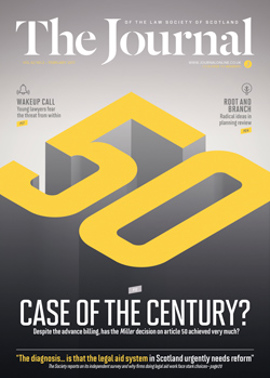Law reform roundup
The Society’s committees have been working on a number of Scottish Parliament and UK Parliament bills and consultations. Key areas are highlighted below. For more information see www.lawscot.org.uk/law-reform
Scottish independence
The Constitutional Law Subcommittee responded to the Scottish Government’s consultation on a draft Referendum Bill. The bill is intended to be ready for introduction should the Scottish Government conclude that seeking the view of the Scottish people on independence is the best or only way to protect Scotland’s interests in the wake of the EU referendum.
The Government has acknowledged that if it decides to introduce the bill to Parliament, it would expect an Order in Council under s 30 of the Scotland Act 1998 to be sought and agreed as in 2014. The Society believes that any order should be in similar terms to the Edinburgh Agreement and would be an essential prerequisite for a lawful referendum. It also recommends that the Government publish a white paper before introducing the bill, detailing key milestones, the mechanics for achieving independence and the transitional arrangements which may be required. This information should be made known in advance of a vote.
Brexit
The Society responded to the House of Commons Exiting the European Union Committee inquiry into the UK’s negotiating objectives for withdrawal from the EU. It highlighted the Society’s key public interest issues, which include: ensuring stability in the law; maintaining freedom, justice and security; recognition and enforcement of citizens’ rights including the rights of parties with pending cases before the EU Court of Justice; promoting immigration, residence, citizenship and employment rights of EU nationals resident in the UK; and taking account of the interest of the devolved administrations and Scots law in the exit negotiations.
It further highlighted key membership issues, including promoting continued professional recognition and rights of audience in the EU and protecting legal professional privilege for the clients of Scottish lawyers working in the EU or advising on EU law.
The Society also responded to the Scottish Government’s paper Scotland’s Place in Europe.
Criminal law
The Criminal Law Committee submitted written evidence to the Scottish Parliament Justice Committee on the legislative consent memorandum for the Criminal Finances Bill. This follows the written briefing sent to MPs in November 2016, which will be updated ahead of the report stage in the House of Commons.
It also submitted written evidence to the Scottish Government on the draft Code of Practice on the Exercise by Constables of Power of Stop and Search of the Person in Scotland; and responded to the Scottish Government’s consultation on regulations to modify Part 1 of the Criminal Justice (Scotland) Act 2016 to deal with arrests which do not relate to criminal offences and arrests under warrant.
Health & Care Professions Council
The Health & Medical Law Subcommittee responded to the Health & Care Profession Council consultation on revised guidance on confidentiality. The guidance provides advice for registrants about some of the issues relating to how they handle and share information about service users.
The committee supports the aim to provide transparency and to ensure that the information given is easy to understand. However, it suggested that more clarity is needed on the distinction between information which is in the public interest and information which is of interest to the public. The draft also fails to fully take into account the distinctive Scottish position: the guidance should include an acknowledgment that current legislation does not always apply to all jurisdictions within the UK.
Reforming the employment tribunal system
The Employment Law Subcommittee responded to the UK Government consultation on the issues to be considered in implementing wider justice system reform principles in the employment tribunal system.
While the consultation refers to the UK Government being committed to transferring responsibility for employment tribunal and EAT functions to the Scottish Government, there has been no announcement as to when this is likely to occur. The committee does not wish the tribunals in Scotland to miss out on any improvements or efficiencies that could be identified and introduced. However, with particular reference to “aging IT systems” and the move towards making more decisions online, it would be opposed to new systems being introduced UK-wide and then being replaced a short time later. This is a concern both in relation to the potential for wasted cost and also the risk to the tribunals’ credibility and authority through the disruption caused by bringing in too many changes in a short space of time.
The Policy Team can be contacted on any of the matters above at policy@lawscot.org.uk; twitter: @lawscotIn this issue
- Miller, Brexit and BreUK-up
- Power to the people?
- Prerogatives, Parliament and the constitution: plus ça change?
- Decisions in high places
- Reading for pleasure
- Journal magazine index 2016
- Opinion: Callum Sinclair
- Book reviews
- Profile
- President's column
- Have you heard of ScotLIS?
- People on the move
- Article 50: the final say
- Where courts fear to tread
- "Wake up": how young lawyers see the future
- How healthy is our legal aid system?
- Challenging assumptions
- Planning to deliver
- Contact and the fear factor
- And the bill goes to...?
- Pakistan to join Child Abduction Convention
- Dress to impress?
- Handcuffing of prisoners and article 3
- Turning up the heat on workplace change
- Scottish Solicitors' Discipline Tribunal
- Not just for the green welly brigade
- Five by five
- Law reform roundup
- Relief over pensions and bankruptcy ruling
- Helpline plus
- Spill the beans on legal aid fraud
- The art of bringing the good news
- Cybercrime: how are you protected?
- Ask Ash
- One year rule becomes three
- From the Brussels office






